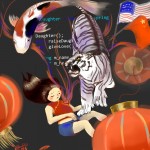An introductory computer science textbook inspired a story about algorithmically approaching father-daughter relationships.
After numerous drafts, the short story became one of 12 in UCLA lecturer Xuan Juliana Wang’s book “Home Remedies: Stories,” which was published May 14. The collection is organized into three sections – family, love, and time and space – and explores experiences, such as feeling lost, pertinent to young Asians in both the United States and China.
Through her book, Wang said she hopes to demonstrate that young Chinese people have stories worth sharing in contemporary English literature.
“I don’t want to make immigrants or diaspora or this immigrant experience an ‘other’ experience – some racialized, politicized experience that should be studied for its historical implications,” Wang said. “I just want to show that these people are complicated and funny and interesting.”
Growing up watching TV, Wang said she particularly enjoyed pharmaceutical commercials, which eventually led her to create the title for her book. She was drawn to the gentle tone of the narrator’s voice and how they provided a simple solution in the form of a pill for a myriad of problems. She used a similar tone when writing the title story “Home Remedies for Non-Life-Threatening Ailments,” she said, using imperative sentences to tenderly guide the reader.
[RELATED: LA Times Festival of Books showcases live poetry readings, cooking demonstrations]
Similar to how pharmaceutical commercials do not provide solutions to common problems, such as grief and self-doubt, Wang said she likewise will not include specific answers in her stories. However, she said the stories can potentially act as a starting point for readers to begin resolving issues.
“When you’re trying to untangle a necklace or headphone, when you pull really hard on both ends, it’s just never going to come apart. But there’s something about reading,” Wang said. “You’re massaging the knots and they loosen up. Maybe one day you’ll be able to untangle them.”
For the story “Algorithmic Problem Solving For Father-Daughter Relationships,” Wang said she was inspired by an undergraduate computer science course at Columbia University, which she took in the hopes of unlocking hidden potential as an engineer.
Despite not performing well in the class, Wang said she fell in love with her textbook, specifically how it broke down problems and tried to solve them algorithmically. When writing her book, she used pseudo-code and instructional sentences to explore the various people in her life that were emotionally unavailable to her, she said.
In her early 20s, Wang said she moved to Beijing for two-and-a-half years, which played a vital role in developing her imagination. As a result, her stories reflect a modern Beijing, said English professor King-Kok Cheung, especially in the story “Days of Being Mild.” She captures the lifestyle through an accurate portrayal of “young” music and current social issues, such as LGBTQ relationships in a homophobic China, Cheung said.
“(The story is) about contemporary Beijing, about the hip, young-people scene,” Cheung said. “These are the kinds of scene that writers like Ha Jin and Yiyun Lee, who had left China quite early, cannot capture.”
For another short story, Wang found inspiration while working as an interpreter for the 2008 Beijing Olympics, she said. She uncovered a hidden story that led her to write “Vaulting the Sea,” which details a love story between two Chinese synchronized divers. Wang said she watched the two divers do an interview during the 2008 Beijing Olympics, and though the interview was muted, she noticed the divers’ body language, indicating a potential romantic interest.
[RELATED: Author Angela Flournoy inspires students to draw on everyday experiences in workshop]
Unlike older Chinese writers like Yiyun Lee, who have influenced Wang, Wang’s book contains plenty of humor, said Justin Torres, an English assistant professor and Wang’s colleague. For instance, in the titular story, the diseases are not fatal and range from depression to simply being stood up by a boyfriend, said Cheung. Regardless of the severity of the disease, there is still a home remedy for it, Cheung said.
Born in China and raised in the States, Wang wrote stories that take place in both China and the U.S., making her book especially relevant today, Torres said. The book captures what it’s like to live between two countries, he said. Cheung said students from both U.S. and China would find the book appealing as many scenes and themes are relatable to them.
“It’s about the U.S. and the Beijing they know. It’s not just about history; books about history are really important, but students would feel more attracted to places, to the scenes they know themselves,” Cheung said. “These are about young people.”
